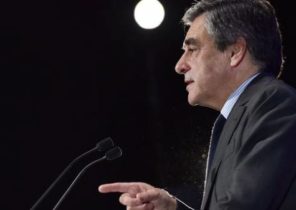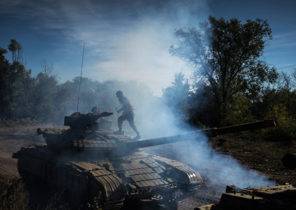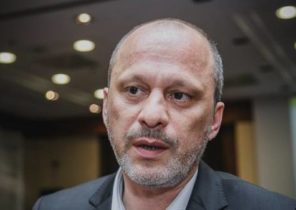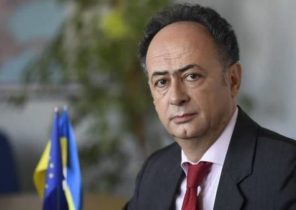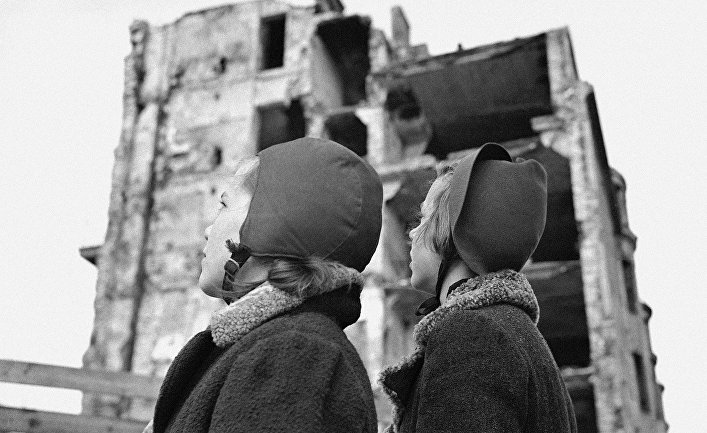
Photo album 76-year-old resident of the city of Oulu Ali Rovio is full of pictures of her military childhood. Eila grateful to my Swedish mother Anna-Lisa for what she is, and subsequently kept his ward in the course of all that has happened in the Swedish house, in which she spent three war years — she even sent pictures of the new furniture.
One of the photos of the baby of Aly made in the Swedish shop before returning to Finland. In her pretty dress, she grins. Eila loved their Swedish mom and dad. The time spent in Skara, was happy.
“In Sweden I was very happy, it shows in the photos. But on the first pictures, made in Finland, the look on my face, and my whole appearance was very different, even hair hung”.
“I remember leaving for Finland. Mom was crying and I was jumping down the stairs and was glad that dad is coming with me.”
The Eila still was disappointed.
The following picture is taken from big pier farm in Rautalampi in July 1947, where she stands next to her sister Senga, which during the war was adopted by another Swedish family, and looks at the approaching boat. In the boat were Finnish mother.
“I looked at my mother with such intensity that I still remember what she was wearing: jacket with circles and stripes and next buttons. The head was surrounded by a braid, it was my mom’s holiday hair”.
On a hot summer day, smelling the lilacs, Eila and Senja was sitting in the boat and went into the house for the evacuees.
“In our family was eight people, and the hut was so small that even the Christmas tree had to be hung under the ceiling, because the floor was not enough space”.
“The beginning was difficult. I managed to forget the Finnish language.”
Soon Eila learned Finnish, but forgot Swedish. Swedish mom wrote Eyl. The teacher translated the girl emails and helped to answer them.
“The importance of the letters of the Swedish mothers I realized only at the age of ten, and then I started to get bored. I just ironed these letters by hand, because not all of them understood”.
In one letter the mother asked Eila if she has your bike.
“I replied that we are even no roads”.
The first time Eila returned to Sweden in 1964, being already a young woman.
“When dad came to meet me, his tears flowed from his eyes. It is difficult to convey the feelings that I experienced then — they were very strong.”
But his son Kent have Martinshof was then adopted daughter Katherine. After that trip, Eila many times came to Sweden, and Swedish family visited Ali in Oulu.
“Mother always said that their house is my home. She congratulated me on my every birthday and Christmas,” says Eila.
A Finnish mother of Ali met with Swedish. The meeting was very touching. Finnish mom said that the experience of separation during the war have broken down the Eila.
“She asked me for forgiveness for what he sent me. I replied that, despite the fact that this path was hard, I’m a rich man because I have two moms”.
Last trip of Aly in Sweden took place in 2003. Swedish mother died in 2009, a Swedish father − in 1987.
“In recent years we wrote a lot to each other”.
The vast majority of Finnish war children maintained contact with their foster parents, at least for some time, said to have written a dissertation and a book about children of war Dr. Pertti kaven (Pertti Kavén).
“The adoptive parents have already died, but communication with the Swedish sisters, brothers and other family members are supported. Many contacts have been preserved, but many of them ended with the departure of parents, about half”, concludes kaven.
The good that was brought this time, children of war is a Swedish family and friends for life. Contacts are maintained mainly through letters, dozens of years, people visit each other’s homes.
“For example, summer holidays spent in Sweden, I’ve done it myself. These trips have had an impact on relationships in own biological family. Eventually, the relationship with the Swedish families became a little cooler, and turned into mutual congratulations at Christmas,” says kaven.
Kaven he maintains relations with his sister living in skövde: “This Swedish sister SIV me like a big sister. In the photos her hand is always on my shoulder”.
If a family in wartime communication was previously not supported, sometimes the question you start to figure out when to retire.
Of course, there are those children of war, which are not maintained relations with their host family after they returned home.
“Everybody’s different. Some never had the need to figure out where they were during the war”.
Kaven himself interested in the question of children in wartime because in his Finnish house never spoke.
“We have was taboo. When I during the war came from Sweden, I was 3.5 years, I forgot Finnish. Cried, missed and ran away from home to their Swedish mom and dad”.
Kaven subsequently realized that his parents could not fully be aware of the feelings of a small child.
For the time military childhood characteristically, the emotional link was broken on both sides. Finnish parents separated, and Swedish became closer.
“A child at this age, of course, feels a sense of abandonment and the time when he was a child of the war, leaves some imprint of neprikayannosti”.
The fact that the house is not talked about it, made Kavena more widely to study the issue.
“The silence I was compensated with talk with other children of war. I wanted to have a reasonably good scientific base in order to get the complete idea about the whole operation.”


